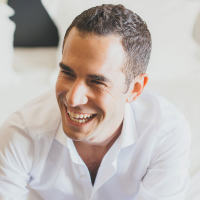Q&A: Plum Guide CEO on Using AI to Disrupt the Short-Term Rental Space

Skift Take
This sponsored content was created in collaboration with a Skift partner.
As the short-term rental industry matures, so do the expectations of its consumers. To meet these rising demands, companies face the dual challenges of maintaining authenticity and delivering hotel-grade comfort. Innovation isn't an option — it's a necessity. Recognizing this, brands are turning to artificial intelligence to stay ahead of the curve.
“We believe that AI is a huge shift, comparable to the arrival of the internet or the move to mobile. It’s the most profound technology we’re working on today to help people, businesses, and communities unlock their potential,” said Finnbar Cornwall, sector leader travel at Google. “Amongst many other use cases, AI can help brands market at the speed of consumers, personalize at scale in a post-cookie world, and help brands maximize profits. Plum Guide is a great example of how brands can apply AI in business, the results have been impressive."
The adage "the early bird catches the worm" rings especially true here. Companies that integrate AI early in their strategies stand to gain a technological edge. But it's not just about plugging in a computer to do all the work — it takes a balance of data-driven insights and human touch to deliver truly exceptional experiences. SkiftX spoke to Doron Meyassed, CEO of Plum Guide, to discover how the company is integrating AI into its operations to streamline services, increase guest satisfaction, and redefine what a quality stay means in the digital age.
SkiftX: How have you brought AI into the fold at Plum Guide, and how is it shaping your operations?

Doron Meyassed: When we started Plum Guide, we were obsessed with defining the ideal criteria for a perfect stay. We interviewed hundreds of people and that led us to create a set of 150 criteria: For example, if a home accommodated eight people, it needed a communal space where everyone could spend time together.
To verify if homes met these criteria, we built an iPad app and sent testers to over 100,000 homes for in-person evaluations. As a result, we began receiving incredible customer feedback, with our NPS (Net Promoter Score, a measure of customer loyalty and satisfaction) substantially higher than our competitors. After a successful funding round, the challenge shifted to scaling without spending an exorbitant amount of money or time.
That's when we decided to prioritize technology in our strategy. Part of this involved the automation of previously manual tasks, but the most transformative aspect was introducing AI into our operations. There were two main areas where AI played a role: vetting the homes and producing the listings.
We've developed a tool that gathers data on every available home in a location. Each home must score at least 4.5 stars and fit our design standards. We applied unique first party data, in this case Plum Guide’s ‘Design Manifesto’ — our bible for distinguishing a great home — into Google’s Vertex AI product, through which we could use the best of Google’s pre-built AI models. This means our AI can evaluate a home to see if it meets our criteria. It combines online reviews, images, and on-site data to predict a home's suitability. If there's ever any doubt, we send human inspectors for verification. Once approved, the AI creates the listing, and a copywriter polishes it.
SkiftX: Plum Guide has distinguished itself by addressing key industry challenges. Can you share some of these issues and how your solutions address them?
Meyassed: Quality assurance is a major challenge. Picking out the truly outstanding homes from the average ones can be difficult. Our solution is rigorous vetting. We examine every home and accept only a fraction of those we assess.
Another challenge is that homes differ from hotels in that they're not always designed for guest comfort. Imagine staying in a multi-million-dollar loft in Manhattan, only to discover a frightfully noisy elevator or to hear banging sounds from the bathroom pipe every time you turn on the shower. While a home may meet our core criteria, it can still have quirks. That's why Plum Guide introduced a feature called "Home Truths." It's a dedicated section that lists anything a guest might not find perfect about the property. We actively seek out this feedback by asking guests to share aspects of their stay that they didn't quite love.
Lastly, we're trying to bridge the service gap by offering two dedicated teams: a matchmaking team and a care team. The former is made up of local experts who intimately know an area to help guests choose their ideal home, and the latter is made up of individuals who are always a click away if guests face any issues during their stay.
SkiftX: Can you share the story of why Plum Guide was founded and how it has grown and evolved over time?
Meyassed: Plum Guide was born from an observation rather than a typical pain point. I found that only one in every 20 places I booked on Airbnb genuinely stood out, despite thorough research. These were hosts who approached their homes with the care of a hotelier — adjusting the ambiance, ensuring perfect bedding, and selecting each piece of furniture and art with intent. The core idea was to create a platform that spotlights and celebrates these dedicated individuals.
As we moved forward with this vision, we realized the broader issue from the consumer side. Travelers were frustrated with the lack of consistency on home rental platforms. Most reviews on platforms like Airbnb have ratings of 4.5 stars or more, which makes distinguishing between properties quite challenging. This led to our evolved mission: to vet every home and curate only the top three percent across different price brackets.
SkiftX: How do you ensure that the human experience and expertise remain central to your operations amidst this AI revolution?
Meyassed: Firstly, humans are central in constantly guiding our AI. For example, training an AI to curate a specific design style is great as long as that style is relevant. But trends change, and we expand into new regions with distinct architectures, like Mexico City or Delhi. If left unchecked, the AI can get stuck in its predefined framework and may overlook these new nuances — that’s where the human element comes in.
Secondly, it's easier to connect with a human on Plum Guide than on most other short-term rental platforms. We’re exploring ways AI can assist our care team, but we're not about to replace them with chatbots. While we're excited about the potential of AI, the human experience will always be at the heart of what we do.
SkiftX: What measurable results or impacts have you noticed since integrating AI into Plum Guide's processes?
Meyassed: The results have been quite remarkable. We've cut the cost of adding a home by 85 percent, sped up listings fivefold, and boosted listing conversion rates by over 45 percent. Interestingly, our NPS has remained steady, which is vital for our brand.
Our NPS was previously high because we had humans visiting each property. With AI in place, the challenge was to maintain the same level of quality. And this goes beyond just cost saving. It's about making our business model viable. Without AI, it would be impractical to send home critics to every remote corner of a region like Tuscany. While it may look like a cost-reduction method, it's truly about enabling our unique approach.
SkiftX: Plum Guide has a mantra, 'No Time for Average Stays.' Can you explain how this ties into your business philosophy and how your AI delivers it?
Meyassed: Simply saying "We offer the best homes" doesn't resonate with guests. It lacks credibility and tends to be glossed over. We needed to find a way to convey our promise more effectively. That’s where the mantra comes in. Our mantra urges people to truly live, to not waste any moment, especially not on subpar holidays. When you choose Plum Guide, you’re choosing a beautiful, soulfully designed space that enriches your life and helps you cherish the limited time you have.
SkiftX: What are some key trends you've observed in consumer preferences and behaviors in the short-term rental industry over the past few years?
Meyassed: An overarching trend I've seen is an increase in people's expectations. As travelers gather more experiences, their understanding of what constitutes a good stay evolves. For example, take our "fridge fill" feature. Guests were initially thrilled with the idea of arriving to a pre-stocked kitchen. But that's become a standard expectation now.
Moreover, the choice to rent homes has evolved from being budget-driven to seeking unique, luxurious experiences. Guests want the charm of local spaces with the consistency hotels offer in basics such as bedding and toiletries. It's a desire of blending the novel with the dependable.
SkiftX: What trends do you foresee in the short-term rental market over the next few years? How will these shape Plum Guide's future strategies and innovations?
Meyassed: Guest expectations will continue to soar. Within a few years, every traveler will expect top-notch amenities, all facilitated through an easy-to-use app. It's been fascinating to see how algorithms are evolving to detect properties that might disappoint, matching the accuracy of seasoned travel experts. This points to a future where tech plays an even more important role in ensuring quality stays.
I also predict a rise in personalized searches. Instead of just selecting a location or room count, travelers will soon describe their ideal stay in detail. Imagine wanting a home that allows deep connection with family, a separate wing due to your light sleeping habits, or proximity to specific amenities.
Property management will shift too. Generic homes might face booking challenges, while niche-focused ones will thrive. Our matchmakers already see this. When customers share detailed preferences, our recommendations often differ vastly from their independent choices. In essence, the future is about quality, consistency, service, and hyper-personalization. And at Plum Guide, we're excited to be at the forefront of these changes.
For more information about Plum Guide, visit plumguide.com.
This content was created collaboratively by Plum Guide and Skift’s branded content studio, SkiftX.





